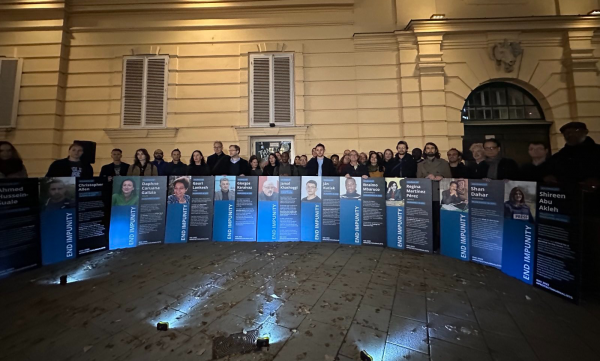In a session titled “Facebook Revolutions: The Media and the Uprisings in North Africa and the Middle East”, to be held on Monday, 26 September 2011, during the IPI World Congress in Taipei, panellists will examine the role that social media networks such as Facebook and Twitter, as well as online media outlets and the so-called traditional media have played in the “Arab Spring” uprisings currently taking place in North Africa and the Middle East.
Shatha Al-Harazi, a human rights journalist for the Yemen Times, joins a panel featuring Charles M. Sennott, executive editor and vice president of the Boston, USA-based GlobalPost and Hosam El Sokkari, Head of Audience, Yahoo! Middle East. Al-Harazi has done remarkable work in using Facebook and similar platforms to get to the facts during the 2011 Yemeni protests and a very confusing time in her country’s history. After graduating from the Faculty of Mass Communications at the University of Sana’a, she soon became the human rights and political editor at the Yemen Times. When the Yemeni revolution began in February, she also started freelancing for major news organizations around the world, including The Guardian and GlobalPost.
Charles Sennott, a long-time foreign correspondent for the Boston Globe, served as its Middle East Bureau Chief based in Jerusalem from 1997-2001 and as Europe Bureau Chief based in London from 2001-05. He co-founded GlobalPost, an online international news agency, in January 2009. GlobalPost’s declared mission is “to redefine international news for the digital age.” With over 65 correspondents in nearly 50 countries, the GlobalPost offers original daily reporting from every region of the world. Sennott led a GlobalPost partnership with PBS FRONTLINE in covering the revolution in Egypt that began in January 2011 and saw firsthand the drama of the world’s first true digital revolution as it unfolded on the streets of Cairo. In April, during the early stages of the Libyan uprising, GlobalPost freelance contributor James Foley and three other foreign journalists were taken captive by Libyan authorities and held for more than six weeks.
As Head of Audience, Hosam El Sokkari is responsible for building Yahoo! Middle East content portfolio, maintaining the editorial policy and managing the editorial teams for Yahoo! sites across the region as well as merging users’ experience across platforms and developing a stronger tie between media and community channels. He is a media professional with extensive experience in both new and traditional media at an international level. A former head of BBC Arabic and a well-known TV presenter and moderator, he has been honoured as one of the 20 individuals shaping the region’s digital media, broadcast and telecommunications industries by Digital Broadcast Magazine. He has also been selected as one of the top 10 media giants of the broadcast industry in the region by Digital Studio Magazine.
The panel will be moderated by veteran journalist Jim Clancy, anchor and correspondent for CNN International. Clancy, who currently anchors “The Brief”, an executive summary of the most important international stories of the day, brings more than 30 years of experience in covering events that have shaped history over the last quarter century. From 1982-96, he was a CNN international correspondent in the Beirut, Frankfurt, Rome and London bureaus. During this time, he won with the George Polk Award for his reporting on the genocide in Rwanda, the Alfred I. duPont Award for coverage of the war in Bosnia, and an Emmy Award for reporting on the famine and international intervention in Somalia.
Themed “The Asia Media Century? 21st Century Developments from New Technologies to Press Freedom,” the 2011 IPI World Congress will focus attention on current developments in Asia in general and East Asia in particular, as well as topics focussed more closely on press freedom and the media industry.
The Congress will feature a high-profile roster of speakers, panellists and moderators from print, broadcast and new media organizations, as well as renowned figures from the fields of politics, business, academia and civil society. Visit the official Congress website to see the evolving programme: www.ipiworldcongress.com
The 2011 IPI World Congress in Taipei is expected to draw some 350 participants and their guests from around the world.


